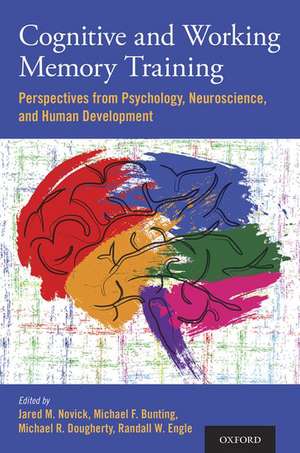Cognitive and Working Memory Training: Perspectives from Psychology, Neuroscience, and Human Development
Editat de Jared M. Novick, Michael F. Bunting, Michael R. Dougherty, Randall W. Engleen Limba Engleză Hardback – 9 ian 2020
Preț: 559.42 lei
Preț vechi: 795.29 lei
-30% Nou
Puncte Express: 839
Preț estimativ în valută:
107.04€ • 112.06$ • 88.57£
107.04€ • 112.06$ • 88.57£
Carte disponibilă
Livrare economică 04-10 martie
Preluare comenzi: 021 569.72.76
Specificații
ISBN-13: 9780199974467
ISBN-10: 0199974462
Pagini: 588
Dimensiuni: 236 x 145 x 36 mm
Greutate: 0.95 kg
Editura: Oxford University Press
Colecția OUP USA
Locul publicării:New York, United States
ISBN-10: 0199974462
Pagini: 588
Dimensiuni: 236 x 145 x 36 mm
Greutate: 0.95 kg
Editura: Oxford University Press
Colecția OUP USA
Locul publicării:New York, United States
Recenzii
These well-written, thoroughly researched chapters offer cognitive scientists an exemplary depiction of what scholars have learned and the questions yet to be pursued.
Notă biografică
Jared Novick, PhD is Associate Professor of Hearing and Speech Sciences at the University of Maryland. His research focuses on the intersection of language, memory, and cognitive control processes.Michael Bunting, PhD is Research Scientist at the University of Maryland Applied Research Laboratory for Intelligence and Security. His research interests include cognitive aptitude and tailored training.Michael Dougherty, PhD is Professor of Psychology at the University of Maryland. His primary research interests lie at the crossroads of attention, memory, and decision-making.Randall Engle, PhD is Professor of Psychology at Georgia Institute of Technology. For 35 years, he has explored the nature of working memory and causes of limitations in its capacity.
